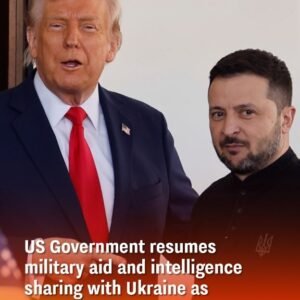The United States has announced the resumption of intelligence sharing and security assistance with Ukraine, marking a significant diplomatic shift. This decision follows high-level talks between U.S. and Ukrainian officials in Jeddah, Saudi Arabia, and signals a renewed commitment to Ukraine’s defense and stability. The meeting, hosted by Saudi Crown Prince Mohammed bin Salman, underscored efforts to foster long-term peace in the region.
Both delegations issued a joint statement affirming their cooperation on multiple fronts, including military aid, humanitarian relief, and economic partnerships. The announcement comes after a period of uncertainty, during which U.S. support had been temporarily paused. This shift is expected to have major implications for Ukraine’s defense strategy and geopolitical stability.
For years, Ukraine has relied on U.S. intelligence and military aid to counter Russian aggression. The temporary suspension of support had raised concerns about Ukraine’s ability to sustain its defensive efforts. With the resumption of assistance, Ukraine regains access to critical intelligence and strategic resources needed to bolster its military operations.
The meeting in Jeddah served as a crucial turning point in U.S.-Ukraine relations. Discussions covered a range of topics, from military coordination to economic collaboration. A key highlight of the talks was a U.S.-proposed 30-day ceasefire, which Ukraine has conditionally accepted, provided that Russia reciprocates.
The ceasefire proposal aims to create a pause in hostilities, allowing for humanitarian aid, prisoner exchanges, and the return of forcibly relocated Ukrainian children. U.S. Secretary of State Marco Rubio emphasized that this initiative is a step toward diplomatic resolution. However, the success of this plan depends on Russia’s willingness to comply.
Resuming intelligence sharing provides Ukraine with valuable insights into Russian military movements and battlefield dynamics. This will enable Ukrainian forces to make more informed strategic decisions, improving their defensive and offensive capabilities. Additionally, renewed U.S. security assistance includes training, equipment, and logistical support.
Beyond military measures, the joint statement also focuses on humanitarian and economic initiatives. Efforts to facilitate prisoner swaps and repatriate displaced Ukrainian children are central to the agreement. These actions are essential for mitigating the humanitarian impact of the ongoing conflict.
The economic component of the agreement aims to strengthen Ukraine’s financial independence. A significant part of this strategy involves developing Ukraine’s critical mineral resources. This initiative is designed to stimulate economic growth while reducing reliance on foreign aid.
The joint statement highlights the role of European allies in supporting Ukraine. Their involvement is key to ensuring that diplomatic efforts remain multilateral and effective. A coordinated approach among Western nations reinforces diplomatic leverage against Russia and promotes long-term regional stability.
Russia’s response remains a major uncertainty. The ceasefire’s success hinges on Russian reciprocity, as the agreement is conditional on mutual compliance. If Russia rejects the proposal, Ukraine and its allies may need to reassess their strategic approach.
Political considerations within Ukraine and the United States also play a role in shaping this policy shift. In Ukraine, the government must balance diplomatic efforts with public sentiment, ensuring that any agreement is perceived as a step toward victory rather than concession. In the U.S., the decision to resume aid is subject to domestic political debates.
Operational challenges must also be addressed. Intelligence sharing and security assistance require seamless coordination between U.S. and Ukrainian defense agencies. Efficient communication and timely delivery of resources will be crucial for maximizing the effectiveness of renewed support.
Looking ahead, negotiations for a long-term peace settlement are expected to begin. While the immediate focus is on ceasefire implementation and military coordination, broader diplomatic efforts will shape Ukraine’s future security landscape. The success of these initiatives will depend on sustained international engagement.
The resumption of U.S. assistance sends a strong signal of commitment to Ukraine’s sovereignty. It also reinforces the broader principle of defending international norms and deterring aggression. This move is likely to influence global geopolitical alignments, particularly in relations between the West and Russia.
In conclusion, the renewed cooperation between the United States and Ukraine marks a pivotal moment in the ongoing conflict. While challenges remain, this development offers a pathway toward stability and security. The coming weeks will be critical in determining whether these efforts lead to meaningful progress in achieving a lasting peace.
